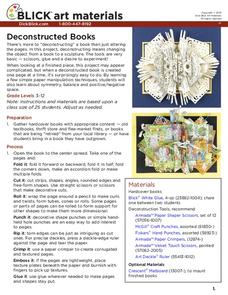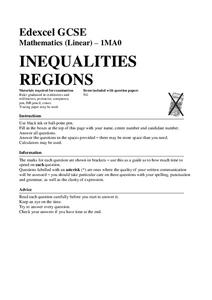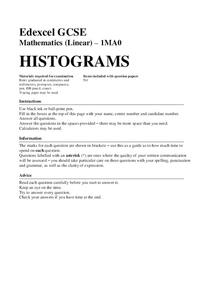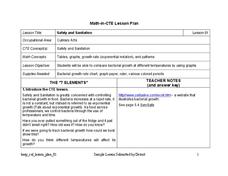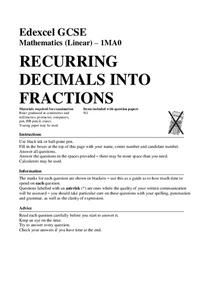Curated OER
My Foot and the Standard Foot
Young mathematicians put one foot in front of the other as they learn how to measure length in an elementary math lesson. Using paper cutouts of their own feet, children measure classroom objects as they discover the importance of...
Dick Blick Art Materials
Deconstructed Books
Scissors, glue, and an old book. Punches, crimpers, and rulers. Kids gather their tools and get set to create relief sculptures by deconstructing books.
Dick Blick Art Materials
Natural Twig Journals
Connect science, art, and language arts with a nature-themed bookmaking project. Kids craft book covers, cut paper for pages, and learn how to bind their creations.
Virginia Department of Education
Surface Area of a Rectangular Prism
Wrap up a lesson on surface area with a resource that asks scholars to use the idea of wrapping paper to investigate surface area. They draw representations of rectangular prisms on graph paper to find the areas of the respective...
Mathed Up!
Reflections
Tracing paper is not just for art anymore — pupils can use it to find reflected images, too! Two videos show how to reflect images using tracing paper and find the reflection between the pre-image and image. Learners perform reflections...
Science Matters
A Model of Plate Faults
The San Andreas fault is one of the longest fault zones in the world. In a series of 20 lessons, the fourth lesson has pupils use a paper model to recreate various types of plate faults. Each is held in position then drawn...
Illustrative Mathematics
The Intersection of Two Lines
Here is an introduction to solving simultaneous linear equations. Start by drawing a line through two points. Create a second line which goes through the intersecting point. Background knowledge of how to find the equation of a line and...
NASA
Cleaning Water
Give young scientists a new appreciation of fresh, clean drinking water. After learning about the ways astronauts recycle their air and water, your class will work in small groups creating and testing their very own water...
Mathed Up!
Inequalities Regions
Discover how to solve systems of inequalities by graphing. An informative video shows pupils how to determine the solution set after graphing each inequality of a system. To finish, a worksheet gives them a chance to practice this skill.
AAAS
Identification and Classification of Grassland Plants
Take learning outside and start classifying grasslands. Young ecologists observe grassland plants in order to classify them into the appropriate species by family. They note their characteristics and where they grow. A true...
Mathed Up!
Rotation
Two videos show first how to perform a rotation, given the center, the angle, and the direction of rotations. Individuals then see how to find what the rotation is from one figure to another. Pupils practice doing both in seven problems...
Mathed Up!
Cumulative Frequency and Box Plots
Learn how to display data. Young data analysts watch a video to review how to create cumulative frequency histograms and box plots. They work on a set of questions to practice producing these data displays.
Mathed Up!
Histograms
Class members explore how to read and use histograms by watching a video on creating and analyzing histograms. To finish, the class works on a set of questions that tests these skills.
Virginia Department of Education
What's the Point?
Point your class in the right direction in plotting points with three activities that give scholars a chance to learn about and practice plotting points on a coordinate plane. They draw figures on the coordinate plane and list out the...
Skyscraper Museum
Changes in a City Over Time
Investigate the growth and development of New York City with the final lesson in this four-part series on skyscrapers. Learners first explore the concept of urban growth by looking closely at a series of three paintings made of Wall...
National Research Center for Career and Technical Education
Safety and Sanitation
Your microbiologists explore the graphing of exponential growth functions using bacteria, like e. coli and salmonella, in a well-written, career and technology lesson.
Mathed Up!
Multiplication and Division
Multiplication and division of decimals by whole numbers is the focus of these assessment worksheets. Learners solve equations by showing their work in order to arrive at the correct answer.
Mathed Up!
Fractional and Negative Indices
Explore how to deal with fractional and negative exponents. Scholars watch a video reviewing fractional, zero, and negative exponents. After the video, they test their skills by completing a worksheet covering the concepts.
Mathed Up!
Compound Interest and Depreciation
Discover how to find the value of an interest-bearing account. Individuals watch a video to learn how to use exponential functions to model compound interest. After the video, they complete a instructional activity of problems on...
Mathed Up!
Simultaneous Equations with a Quadratic
Viewers discover how to solve quadratic-linear systems with a video that first explains the substitution method for solving a system of equations involving a quadratic. Scholars then complete a worksheet of practice problems.
Mathed Up!
Sine and Cosine Rules and Area of Triangles
Learners discover how to find missing sides and angles using trigonometry. Scholars first watch a video covering the Law of Sines and Cosines, as well as the area formula for a triangle. To test their knowledge, they complete a worksheet...
Mathed Up!
Recurring Decimals
Explore how to convert repeating decimals to fractions with an informative video that teaches young mathematicians how to translate between decimals and fractions. After viewing, individuals complete a set of problems to practice...
Chicago Botanic Garden
Historical Climate Cycles
What better way to make predictions about future weather and climate patterns than with actual climate data from the past? Young climatologists analyze data from 400,000 to 10,000 years ago to determine if climate has changed over...
National Council of Teachers of Mathematics
Stitching Quilts into Coordinate Geometry
Who knew quilting would be so mathematical? Introduce linear equations and graphing while working with the lines of pre-designed quilts. Use the parts of the design to calculate the slope of the linear segments. The project...

